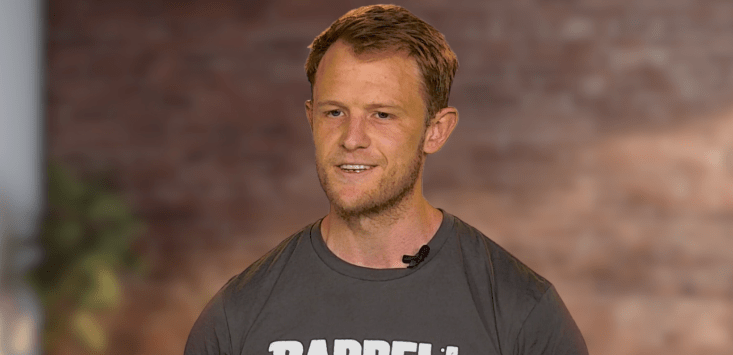
Barbell Foods’ CFO and co-founder Tom Hutchinson.
To develop the business to where it is today, Barbell Foods’ CFO and co-founder Tom Hutchinson had to get right outside his comfort zone when the business was just starting out. But it gave him valuable skills he has been able to draw on as the company has grown. Tom and his three co-founders, Matt, Luke and Rory, all South African natives, started Barbell to make healthy, sustainable meat snacks to keep people satiated until their next meal.
Educating the market about biltong, a relatively unknown product when the business was launched, meant Tom had to quickly build his ability to sell the sizzle in the business. This, and an innate ability to prioritise, have helped underpin the company’s future.
“We had to hustle to get the brand out there, doing markets every weekend with a product most Australians didn’t know, yelling out to people all day, ‘have you heard of biltong?’ We had to be very out there, which was counter to my natural disposition. But it made me realise I had it in me to be out front,” he says.
Salesmanship aside, Tom says the senior leadership team’s ability to pinpoint priorities in the business contributes to its success.
“Food safety and quality control come first and there have been times when we have had to make expensive decisions to make sure they do. For instance, we never send a product out into the market if it’s not perfect. This might cost money, but in the long run, it’s best for the brand and best for our customers. It’s more than a philosophical take on how to manage disruptions, it’s the crux of how we operate as a team.”
Switch to Australia’s most recommended major business bank today.
The power of partnerships
Like many businesses, Barbell Foods has navigated a demanding growth path. Having the Commonwealth Bank’s support has been paramount.
“We had a chicken and egg problem initially. We were at capacity, in the kitchen cutting steaks three times a day, every day. We couldn’t produce any more and we couldn’t employ anyone because our production process was inefficient. We knew we had to do something.”
Tom and his three co-founders needed the support of a big bank like Commonwealth Bank to finance a new manufacturing facility that would allow the business to grow.
“That required getting out of the day-to-day and big picture thinking. It was a huge moment. There was constant change from all angles. We were construction project managers, while still pumping out product in our other facility and also putting together financial plans.
Tom has some insights about how to build a great relationship with a bank.
“You need to sell the strategy behind the brand. Let them know who your customers are, who your prospective customers will be and how you deal with suppliers. That will give them confidence to invest in you.
“They still are going to look at the numbers. But you build trust and goodwill if you pick up the phone, let your bank manager know exactly the situation you’re in, what the business needs and why. If you can tell that story succinctly, the bank can help support a much faster growth rate than if you were to bootstrap the business.”
Tom says having the same bank manager throughout Barbell Foods’ relationship with the Commonwealth Bank has been a huge positive. “Everyone at the bank has a can-do attitude. They are very responsive, professional and supportive.”
His advice to entrepreneurs to be successful is to embrace change.
“At the start, we were guilty of shiny object syndrome, where we would get excited by the next idea or the next big thing. Of course, you need to constantly evolve. But you need to be clear about what you do well and double down on that. You also need to thoroughly think through your plans and stick to them for a period of time. That’s the most important thing when it comes to really moving the needle for a company.”
Tom’s top tips for starting out and staying in business:
- Sometimes you need to narrow your focus and not allow potential contingencies to hold you back.
- Accept scenarios will pop up you were not expecting and be ‘anti-fragile’ in those moments. Be responsive and take decisive action.
- Be as transparent as you can with your plans. Show the bank the business cases for each loan. That’s the way to find a win-win for both parties.
Watch now: How Barbell foods embraces change to drive success
This article is intended to provide general information of an educational nature only. It does not have regard to the financial situation or needs of any reader and must not be relied upon as financial product advice. You should consider seeking independent financial advice before making any decision based on this information. The information in this article and any opinions, conclusions or recommendations are reasonably held or made, based on the information available at the time of its publication but no representation or warranty, either expressed or implied, is made or provided as to the accuracy, reliability or completeness of any statement made in this article. Commonwealth Bank of Australia ABN 48 123 123 124. AFSL and Australian Credit Licence 234945.
The Commonwealth Bank (ASX:CBA) is one of Australia’s leading providers of personal banking, business and institutional banking and share broking services. With more than 15 million customers and a history spanning more than a century, the Group’s purpose is to build a brighter future for all. The Commonwealth Bank is Australia’s leader in digital banking and maintains the largest branch network across the country. For more information on Commonwealth Bank, visit commbank.com.au/business.


COMMENTS
Reader comments have been turned off on this post.